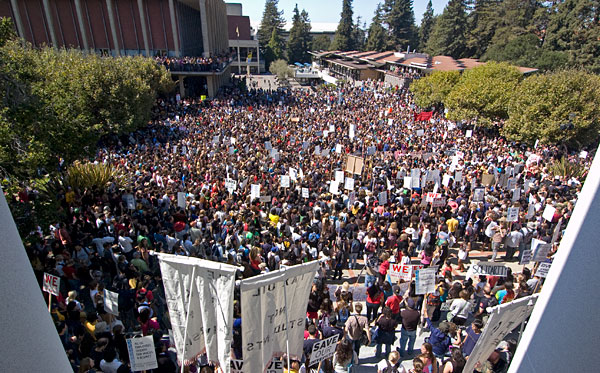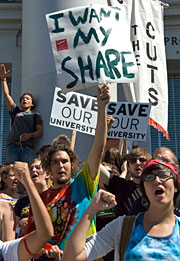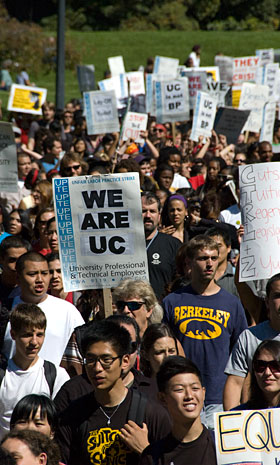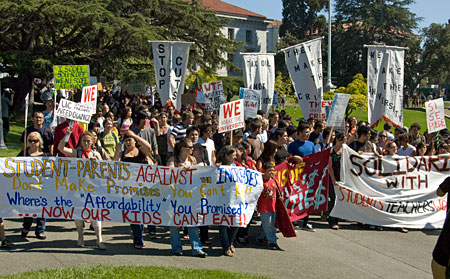 An estimated 5,000 protesters filled Sproul Plaza to decry university and state budget cuts. (Photos by Steve McConnell/UC Berkeley NewsCenter)
An estimated 5,000 protesters filled Sproul Plaza to decry university and state budget cuts. (Photos by Steve McConnell/UC Berkeley NewsCenter)Boisterous rally draws thousands to Sproul Plaza to vent anger at UC cutbacks
Hundreds take part in one-day walkout; others place blame for systemwide budget crisis on Sacramento
| 24 September 2009
Also: Message from the chancellor and EVC&P
BERKELEY —The UC budget wars came home Thursday as thousands of students, staff, and faculty held a series of events on and around campus to protest administrative measures including student-fee hikes, staff layoffs, and unpaid furloughs for staff and faculty.
About 5,000 people, many wearing red armbands and carrying placards, overflowed Sproul Plaza for a noontime rally that some veterans of earlier protests called the largest such gathering there since the Vietnam-war era. Following longstanding Berkeley tradition, speakers addressed the crowd from the Sproul steps, urging those able to make out their words to "save UC" from the draconian budget cuts — more than $800 million systemwide — that have led to steps that even top UC officials acknowledge threaten the university's public mission. Administrators — backed by large numbers of faculty and staff — have sought to put the onus squarely on Sacramento, demanding that legislators fully fund higher education in California.
Following the two-hour rally, as helicopters hovered above and squad cars and motorcycles cordoned off the streets, a boisterous column of several thousand marched through the campus and up Bancroft Way to Telegraph Avenue, where a smaller group of protesters staged a sit-down and blocked traffic briefly.
 Signs and chants were everywhere as protesters soaked up the sun as well as the speeches.
Signs and chants were everywhere as protesters soaked up the sun as well as the speeches.Campus disruptions, however, were minimal. Of Berkeley's 10,000 or so staff employees, managers reported that 138 workers — most members of the University Professional and Technical Employees (UPTE), the Coalition of University Employees (CUE), and the American Federation of State, County and Municipal Employees (AFSCME) — complied with those unions' call for a one-day walkout to protest university-wide pay cuts. The Bancroft Library closed for the day due to a shortage of security guards.
Students came out in force to voice their opposition to — and outrage over — reductions in course offerings, increases in class size, and proposed fee hikes likely to exceed 30 percent next year. Faculty throughout the UC system called for a walkout "in solidarity with UC staff and students" and "in defense of public education." Among the demands of a petition signed by more than 1,000 UC faculty members was that workers earning under $40,000 a year be exempted from mandatory furloughs and pay cuts that began this month for most of the system's staff and faculty.
A survey of campus departments suggested that while some classrooms and lecture halls remained empty, many faculty members had arranged to meet with students at alternate locations. Of 33 political-science classes scheduled for the day, only one was reported canceled.
 Students, union members and others carried signs protesting the deep budget cuts the university is suffering. |
Much of the anger on display Thursday was directed at UC President Mark Yudof, who proposed the furlough plan to the Board of Regents and has called for new student-fee increases of more than 30 percent. But many observers view the problem as having its roots in Sacramento, where legislators have struggled to cope with multi-billion-dollar state budget deficits expected to continue for years to come — mainly by slashing funds for everything from home healthcare to higher education.
Lawrence Pitts, UC's interim provost and executive vice president for academic affairs, said in a statement Thursday that he understood the "anger and angst spread across our campuses," and agreed that "faculty, students, and staff have a right to be upset" at the fallout from the system's budget crisis. But he expressed hope that the anger "will be directed more precisely at Sacramento, where the heart of the problem lies in shifting political priorities and a dysfunctional system of governance."
At Berkeley, adjunct professor Martha Olney seized the opportunity to turn her late-afternoon macroeconomics class into a teach-in on the economic and political factors behind the cuts at Berkeley, which faces a $150 million shortfall for the coming year.
She shared the class with fellow economists Brad DeLong and John Quigley, who together delivered a primer on how California, and the university, got where they are today: The recession triggered state spending cuts because tax revenues sank drastically, and because California can't run a deficit the way the federal government does. Adding to the strain are the long-term effects of Proposition 13, the 1978 ballot initiative that slashed property taxes to local governments — and changed the law to require a two-thirds or supermajority vote for any tax increase.
Reduced income, Olney explained, gives the state two choices — either raising taxes or cutting spending. And, a recession's a bad time for a tax hike.
"That means furloughs for UC Berkeley," said DeLong.
 With banners and chants expressing their opinions, a broad stream of marchers flowed through the heart of campus.
With banners and chants expressing their opinions, a broad stream of marchers flowed through the heart of campus.What's the solution to California's ongoing budget problems?
"I would say a California constitutional convention," said DeLong. "It's pretty clear that the initiative process leads us in a lot of bizarre directions… It's time to wipe the slate clean and start over with a new state constitution."
Olney urged her students to "go to Sacramento, talk to the people who make the laws and make them hear you and hear the value of higher education.
"That," she added, "is the way to effect change."

